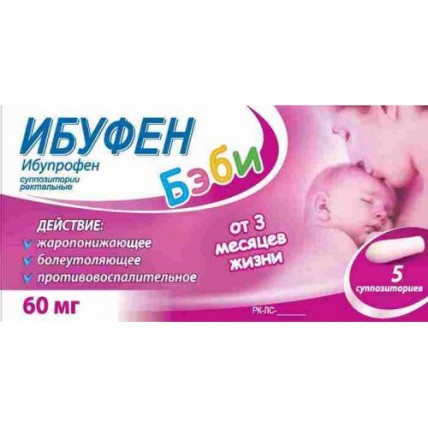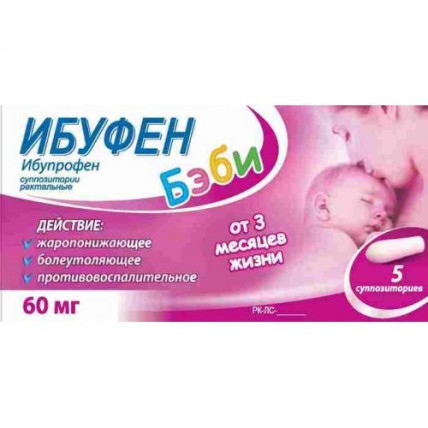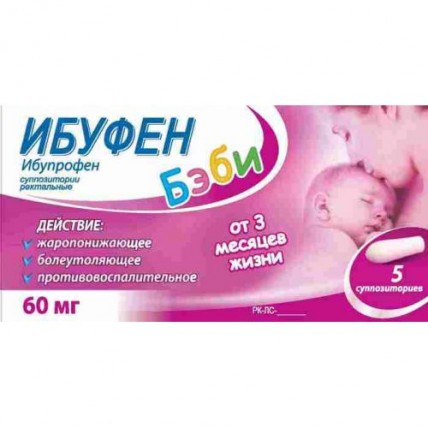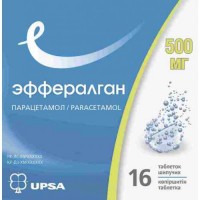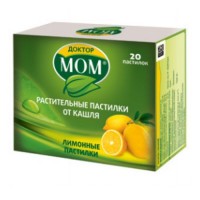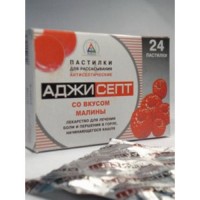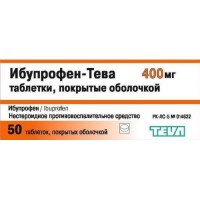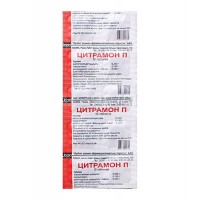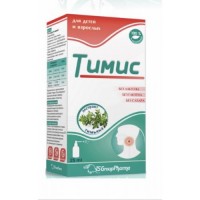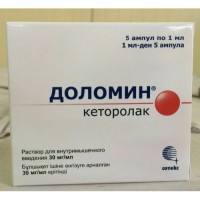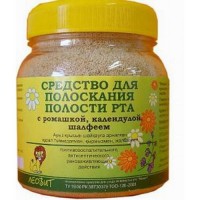Baby Ibufen 60 mg rectal suppositories 5's
- $6.40
The instruction for medical use
of medicine
Ibufenum of the Baby
the Trade name
Ibufenum of the Baby
the International unlicensed
name Ibuprofen Dosage Form
Suppositories rectal
Structure
contains One suppository:
active agent: ibuprofen of 0.06 g or 0.125 g
excipients: solid fat (Vitepsol H15), solid fat (Vitepsol W45)
Description
White or almost white suppositories, torpedo-shaped form
Pharmacotherapeutic group
Anti-inflammatory and antirheumatic drugs. Non-steroidal anti-inflammatory drugs. Propionic acid derivatives. Ibuprofen.
The ATX M01AE01 code
the Pharmacological
Pharmacokinetics At properties rectal administration an ibuprofen is soaked up quickly and almost completely. The maximum concentration in serum is observed in 45 minutes after applique (for a dosage of 60 mg), 1 hour 25 minutes after applique (for a dosage of 125 mg).
The ibuprofen contacts in more than 99% proteins of blood plasma. The ibuprofen and its metabolites are completely and quickly brought out of an organism through kidneys. Elimination half-life of a product makes about 2 hours.
A pharmacodynamics
the Ibuprofen this derivative propionic acid with febrifugal, analgeziruyushchy and anti-inflammatory action.
The mechanism of anti-inflammatory action of an ibuprofen is connected with suppression of synthesis and release of prostaglandins as a result of braking of activity of the cyclooxygenase of prostaglandins catalyzing transformation of arachidonic acid into prostaglandins and existence of other mechanisms is not excluded.
It is proved that febrifugal and analgeziruyushchy action of an ibuprofen begins in 30 minutes after reception of a medicinal product.
Indications
- decrease in temperature
- simplification of slight and moderate pain at a teething, a toothache, a headache, pain in stretchings and dislocations, pain in a tonsillitis and ear pain
- pain relief and fevers in connection with cold and flu.
Drug at a dose of 60 mg is shown to use for children from 3 months to 2 years.
Drug at a dose of 125 mg is shown to use for children from 2 to 6 years.
A route of administration and doses
For rectal use.
The single dose should not exceed 10 mg/kg of body weight.
The maximum daily dose of an ibuprofen makes 20-30 mg/kg of body weight and has to be divided into 3-4 single doses.
For a dosage of 60 mg:
Not to apply at children aged up to 3 months.
Not to apply at children weighing less than 6 kg.
Usually applied dosing mode:
Age (weight)
the Single dose
the Daily dose
From 3 to 9 months
(from 6 to 8 kg)
1 suppository
3 times in every day of 6-8 hours. Not to apply more than 3 suppositories a day.
From 9 months
to 2 years
(from 8 to 12 kg)
1 suppository
4 times in every day of 6 hours. Not to apply more than 4 suppositories a day.
Children up to 6 months can give drug only after consultation with the doctor.
For a dosage of 125 mg:
Not to apply at children weighing less than 12.5 kg.
Age (weight)
the Single dose
the Daily dose
From 2 to 4 years
(from 12.5 to 17 kg)
1 suppository
3 times in every day of 6-8 hours. Not to apply more than 3 suppositories a day.
From 4 to 6 years
(from 17 to 20.5 kg)
1 suppository
4 times in every day of 6 hours. Not to apply more than 4 suppositories a day.
Children up to 2 years can appoint drug only after consultation with the doctor.
It is impossible to apply a product longer than 3 days, without medical prescription.
At not termination of symptoms or their strengthening, or at emergence of new symptoms it is necessary to see a doctor.
Side effects
At drug use side effects are observed seldom if to use drug short time in the minimal effective dose necessary for elimination of symptoms. At treatment of chronic diseases, at long-term treatment, there can be additional side effects.
The undesirable phenomena which can arise at treatment by an ibuprofen are grouped in occurrence frequency as follows: very often (& ge, 1/10), it is frequent (& ge, 1/100 - & lt, 1/10), infrequently (& ge, 1/1000 - & lt, 1/100), is rare (& ge, 1/10000 - & lt, 1/1000), is very rare (& lt, 1/10000), it is unknown (it is impossible to estimate on the available data).
Disturbances from digestive tract
Infrequently: abdominal pain, nausea, dyspepsia.
Seldom: diarrhea, meteorism, constipation, vomiting.
Very seldom: a melena, vomiting blood, a stomacace, exacerbation of colitis and Crohn's disease, gastritis, a peptic ulcer of a stomach, perforation or gastrointestinal bleedings, sometimes from the death.
Disturbances from nervous system
Infrequently: headache.
Disturbances from kidneys and urinary tract
It is very rare: an acute renal failure, papillary necrosis, especially at long-term treatment, connected with increase in urea in blood serum and hypostasis.
Disturbances from blood and lymphatic system
Very seldom: hemopoietic disturbances (anemia, leukopenia, thrombocytopenia, pancytopenia, agranulocytosis).
The first signs can include: fever, a sore throat, superficial damages to an oral cavity, grippopodobny symptoms, strong fatigue, bleedings from a nose and hemorrhage in skin or soft hypodermic tissues.
Disturbances from heart
It is very rare: at a combination to treatment of NPVP messages about hypostases, high blood pressure and heart failure arrived.
Disturbances from a liver and biliary tract
It is very rare: an abnormal liver function, especially at long therapy, a cholestasia, jaundice, hepatitis, increase in level of enzymes in blood serum.
Disturbances from skin and hypodermic cellulose
Very seldom: severe forms of skin reactions, such as polymorphic erythema, toxic epidermal necrolysis, Stephens-Johnson's syndrome.
Disturbances from the immune system
Infrequently: reactions of hypersensitivity with skin rash and an itching.
Very seldom: heavy general reactions of hypersensitivity which can be shown by a face edema, a paraglossa, throat hypostasis, short wind, tachycardia, hypotonia (anaphylaxis, an angiodystrophia or heavy shock), exacerbation of asthma and a bronchospasm. At patients with the existing autoimmune disorders (for example, a system lupus erythematosus, the mixed disease of connective tissue) during treatment the ibuprofen observed isolated cases of symptoms of aseptic meningitis, such as stiff neck, headache, nausea, vomiting, fever and disorientation.
Disturbances from respiratory organs, a thorax and mediastinum
It is very rare: reactions of hypersensitivity, such as asthma, exacerbation of asthma, bronchospasm or dispnoe.
Contraindications
- hypersensitivity to an ibuprofen or excipients as a part of drug
- hypersensitivity to salicylates or other non-steroidal anti-inflammatory drugs (NPVP). Patients at whom is after any use from these drugs had a bronchospasm, a Quincke's edema, urticaria or rhinitis, there is an increased risk of emergence of allergic reaction because of cross sensitivity to these drugs
- existence in the anamnesis of bleeding or perforation of digestive tract in the result of treatment with NPVP group drugs
- active stomach ulcer or bleeding, or a recurrent ulcer stomach/bleeding in the anamnesis (not less than two documented cases of an ulceration or bleeding, or other gastrointestinal disorders)
- heavy heart failure
- a heavy liver/renal failure.
- The III trimester of pregnancy
- hemorrhagic diathesis
- babies with body weight is lower than 6 kg, aged up to 3 months (for a dosage of 60 mg)
- children with body weight to 12.5 kg (for a dosage of 125 mg).
Medicinal interactions
It is necessary to avoid use of an ibuprofen together with:
- acetylsalicylic acid, except for cases of its use in small doses (up to 75 mg/day) according to the recommendation of the doctor. Simultaneous use can increase risk of side reactions
- with other drugs from group of non-steroidal anti-inflammatory drugs, including selection inhibitors of cyclooxygenase-2. It is necessary to avoid simultaneous use of two or several non-steroidal anti-inflammatory drugs in order to avoid increase in risk of side reactions
the Simultaneous use of an ibuprofen and some drugs can lead to the following undesirable interactions:
- corticosteroids - increase in risk of an ulceration and bleeding of digestive system
- anticoagulants - NPVP can strengthen effect of anticoagulants, for example, of warfarin. For this reason their simultaneous use is possible only under control of the doctor
- antitrombotichesky and selective serotonin reuptake inhibitors - increase in risk of bleeding of digestive system
- APF inhibitors and antagonists of angiotensin II: NPVP can reduce diuretic effect and effect of other antihypertensive drugs. Some patients with impaired renal function have a combined use of APF inhibitor or the antagonist of angiotensin II and drugs which inhibit cyclooxygenase, can lead to further deterioration in renal function, including a possibility of an acute renal failure which, as a rule, reversible. These interactions should be considered at the patients accepting an ibuprofen along with APF inhibitors or antagonists of angiotensin II. Thus, simultaneous use should be carried out with care. Patients have to use enough water, it is necessary to carry out monitoring of function of kidneys after the beginning of the accompanying therapy and periodically further.
- cardiac glycosides - NPVP can aggravate heart failure, reduce glomerular filtration and increase the level of cardiac glycosides in plasma
- lithium - deterioration in removal of lithium
- a methotrexate - deterioration in removal of a methotrexate,
- cyclosporine - increase in risk of nephrotoxicity of NPVP
- non-steroidal anti-inflammatory drugs (acetylsalicylic acid and other) - it is necessary to avoid simultaneous use of two or several NPVP
- aminoglycosides - deterioration in function of kidneys at susceptible people, deterioration in removal of aminoglycosides and increase in their concentration in plasma,
- probenetsid - delay of metabolism and deterioration in removal of NPVP and their metabolites
- anti-diabetic drugs - sulfonamide metabolism delay, lengthening of the period of its half-decay and increase in risk of a hypoglycemia
- the zidovudine - is data on increase in risk of a hemarthrosis and hematoma at the HIV-positive patients with hemophilia receiving at the same time treatment by a zidovudine and an ibuprofen.
Special instructions
Side effects can be reduced at use of a minimal effective dose through the minimum possible spans.
Developing of bleedings, ulcerations and perforation of digestive system (some of which can be led to a lethal outcome) perhaps at any time at use of nonsteroid anti-inflammatory drugs, with the warning symptoms or without them, regardless of data of the anamnesis that is proved for all drugs of the NPVP group.
The risk of bleedings, ulcerations or perforation of digestive system at patients at whom in the anamnesis the ulcer is specified increases with increase in a dose of non-steroidal anti-inflammatory drugs. Such patients are recommended to begin treatment with the minimum possible dose. For such patients and also for patients who need to carry out treatment using a low dose of acetylsalicylic acid or other drugs which can increase risk of emergence of side effects in digestive system it is necessary to consider option of the combined treatment using protective drugs (for example, inhibitors of the proton pump).
The care at use of drug for the patients who are at the same time using other drugs which can increase risk of appearance of an ulcer or bleeding, such as oral corticosteroids, anticoagulants (for example, warfarin), selective serotonin reuptake inhibitors or antitrombotik is necessary (for example, acetylsalicylic acid).
The care at use of drug for patients in whose anamnesis diseases of digestive system are specified (ulcer colitis, Crohn's disease) as exacerbation of diseases is possible is necessary.
Patients in whose anamnesis there are data indicating toxic effect of drugs on digestive system should be warned about need to report to the doctor about emergence of any abnormal abdominal symptom (especially in case of bleeding in digestive system), especially in an initiation of treatment.
If during use of an ibuprofen the bleeding or an ulceration in digestive tract is revealed, it is necessary to stop drug use at once.
The care at use of drug for patients in whose anamnesis there are data on a hypertension and/or heart failure as at use of non-steroidal anti-inflammatory drugs the delay of liquid and formation of hypostases is possible is necessary.
The care at use of drug for patients with a liver failure is necessary and also with a renal failure as it can lead to further deterioration in function of kidneys. At treatment of such patients it is necessary to apply minimum possible dose of drug and to regularly control function of kidneys.
Use of an ibuprofen can cause asthma attack in patients with asthma, especially patients at whom is after any use from non-steroidal anti-inflammatory drugs earlier had a bronchospasm, a Quincke's edema, urticaria or rhinitis (cross hypersensitivity).
It is necessary to be careful to patients with a system lupus erythematosus and other diseases of connective tissue.
Serious skin reactions (sometimes with a lethal outcome) on non-steroidal anti-inflammatory drugs, including exfoliative dermatitis, Stephens-Johnson's syndrome and a toxic epidermal necrolysis, are recorded seldom or never. The highest risk of emergence of the specified symptoms exists in an initiation of treatment, most often in the first month of use of NPVP. If during use of an ibuprofen there is skin rash, damages of a mucous membrane or other signs of hypersensitivity, it is necessary to stop drug use at once.
It is necessary to avoid simultaneous use of an ibuprofen with other non-steroidal anti-inflammatory drugs, including selection inhibitors of cyclooxygenase-2.
There are data specifying that the drugs inhibiting cyclooxygenase/prostaglandin synthesis can reduce reproductive ability of women and influence an ovulation. The specified action has reversible character and stops after the treatment termination.
The care at use of drug for patients with disturbances of an anus or a rectum is necessary.
Pregnancy and the period of a lactation
According to literary data the ibuprofen is contraindicated during the third trimester of pregnancy.
In limited tests it was established that the ibuprofen is allocated in maternal milk in very low concentration therefore the probability that it has negative effect on babies, is very small.
Features of influence of medicine on ability to run motor transport and other potentially dangerous mechanisms
At short-term use drug does not affect ability to driving of motor transport, the control of mechanisms in the movement or its influence is insignificant.
Overdose
Symptoms of overdose can include nausea, vomiting, an abdominal pain, a headache, dizziness, drowsiness, a nystagmus, turbidity of sight, a ring in ears and, more rare, hypotension, a metabolic acidosis, a renal failure and a loss of consciousness.
The dose over 200 mg/kg bears risk of emergence of toxicity.
Specific antidote does not exist.
Patients should carry out symptomatic treatment as required. Maintenance therapy in case of need is shown.
A form of release and packing
On 5 suppositories in blister strip packagings from a film polyvinylchloride laminated by polyethylene.
On 1 planimetric strip packaging together with the instruction for use in the state and Russian languages put in a pack cardboard.
To Store storage conditions in original packing at a temperature not over 25C, in the place protected from moisture.
To store out of children's reach!
2 years
not to apply a period of storage after expiry date.
Prescription status
Without prescription
the Producer
the Beekeeping pharmaceutical enterprise,
OOO Apipol-Farma H. Tsegelsky St. 2, 32-400 to Myslenitsa, Poland
the Owner of the registration certificate
of JSC Khimfarm,
the Address of the organization accepting in the territory of the Republic of Kazakhstan claims from consumers on quality of products
of JSC Khimfarm, Shymkent, Republic of Kazakhstan, Rashidov St., 81
the Address of the organization in the territory of the Republic of Kazakhstan responsible for post-registration observation of safety of medicine
of JSC Khimfarm Republic of Kazakhstan, Shymkent, Rashidov St., 81
to Develop Kazakhstan
of medicine
Ibufenum of the Baby
the Trade name
Ibufenum of the Baby
the International unlicensed
name Ibuprofen Dosage Form
Suppositories rectal
Structure
contains One suppository:
active agent: ibuprofen of 0.06 g or 0.125 g
excipients: solid fat (Vitepsol H15), solid fat (Vitepsol W45)
Description
White or almost white suppositories, torpedo-shaped form
Pharmacotherapeutic group
Anti-inflammatory and antirheumatic drugs. Non-steroidal anti-inflammatory drugs. Propionic acid derivatives. Ibuprofen.
The ATX M01AE01 code
the Pharmacological
Pharmacokinetics At properties rectal administration an ibuprofen is soaked up quickly and almost completely. The maximum concentration in serum is observed in 45 minutes after applique (for a dosage of 60 mg), 1 hour 25 minutes after applique (for a dosage of 125 mg).
The ibuprofen contacts in more than 99% proteins of blood plasma. The ibuprofen and its metabolites are completely and quickly brought out of an organism through kidneys. Elimination half-life of a product makes about 2 hours.
A pharmacodynamics
the Ibuprofen this derivative propionic acid with febrifugal, analgeziruyushchy and anti-inflammatory action.
The mechanism of anti-inflammatory action of an ibuprofen is connected with suppression of synthesis and release of prostaglandins as a result of braking of activity of the cyclooxygenase of prostaglandins catalyzing transformation of arachidonic acid into prostaglandins and existence of other mechanisms is not excluded.
It is proved that febrifugal and analgeziruyushchy action of an ibuprofen begins in 30 minutes after reception of a medicinal product.
Indications
- decrease in temperature
- simplification of slight and moderate pain at a teething, a toothache, a headache, pain in stretchings and dislocations, pain in a tonsillitis and ear pain
- pain relief and fevers in connection with cold and flu.
Drug at a dose of 60 mg is shown to use for children from 3 months to 2 years.
Drug at a dose of 125 mg is shown to use for children from 2 to 6 years.
A route of administration and doses
For rectal use.
The single dose should not exceed 10 mg/kg of body weight.
The maximum daily dose of an ibuprofen makes 20-30 mg/kg of body weight and has to be divided into 3-4 single doses.
For a dosage of 60 mg:
Not to apply at children aged up to 3 months.
Not to apply at children weighing less than 6 kg.
Usually applied dosing mode:
Age (weight)
the Single dose
the Daily dose
From 3 to 9 months
(from 6 to 8 kg)
1 suppository
3 times in every day of 6-8 hours. Not to apply more than 3 suppositories a day.
From 9 months
to 2 years
(from 8 to 12 kg)
1 suppository
4 times in every day of 6 hours. Not to apply more than 4 suppositories a day.
Children up to 6 months can give drug only after consultation with the doctor.
For a dosage of 125 mg:
Not to apply at children weighing less than 12.5 kg.
Age (weight)
the Single dose
the Daily dose
From 2 to 4 years
(from 12.5 to 17 kg)
1 suppository
3 times in every day of 6-8 hours. Not to apply more than 3 suppositories a day.
From 4 to 6 years
(from 17 to 20.5 kg)
1 suppository
4 times in every day of 6 hours. Not to apply more than 4 suppositories a day.
Children up to 2 years can appoint drug only after consultation with the doctor.
It is impossible to apply a product longer than 3 days, without medical prescription.
At not termination of symptoms or their strengthening, or at emergence of new symptoms it is necessary to see a doctor.
Side effects
At drug use side effects are observed seldom if to use drug short time in the minimal effective dose necessary for elimination of symptoms. At treatment of chronic diseases, at long-term treatment, there can be additional side effects.
The undesirable phenomena which can arise at treatment by an ibuprofen are grouped in occurrence frequency as follows: very often (& ge, 1/10), it is frequent (& ge, 1/100 - & lt, 1/10), infrequently (& ge, 1/1000 - & lt, 1/100), is rare (& ge, 1/10000 - & lt, 1/1000), is very rare (& lt, 1/10000), it is unknown (it is impossible to estimate on the available data).
Disturbances from digestive tract
Infrequently: abdominal pain, nausea, dyspepsia.
Seldom: diarrhea, meteorism, constipation, vomiting.
Very seldom: a melena, vomiting blood, a stomacace, exacerbation of colitis and Crohn's disease, gastritis, a peptic ulcer of a stomach, perforation or gastrointestinal bleedings, sometimes from the death.
Disturbances from nervous system
Infrequently: headache.
Disturbances from kidneys and urinary tract
It is very rare: an acute renal failure, papillary necrosis, especially at long-term treatment, connected with increase in urea in blood serum and hypostasis.
Disturbances from blood and lymphatic system
Very seldom: hemopoietic disturbances (anemia, leukopenia, thrombocytopenia, pancytopenia, agranulocytosis).
The first signs can include: fever, a sore throat, superficial damages to an oral cavity, grippopodobny symptoms, strong fatigue, bleedings from a nose and hemorrhage in skin or soft hypodermic tissues.
Disturbances from heart
It is very rare: at a combination to treatment of NPVP messages about hypostases, high blood pressure and heart failure arrived.
Disturbances from a liver and biliary tract
It is very rare: an abnormal liver function, especially at long therapy, a cholestasia, jaundice, hepatitis, increase in level of enzymes in blood serum.
Disturbances from skin and hypodermic cellulose
Very seldom: severe forms of skin reactions, such as polymorphic erythema, toxic epidermal necrolysis, Stephens-Johnson's syndrome.
Disturbances from the immune system
Infrequently: reactions of hypersensitivity with skin rash and an itching.
Very seldom: heavy general reactions of hypersensitivity which can be shown by a face edema, a paraglossa, throat hypostasis, short wind, tachycardia, hypotonia (anaphylaxis, an angiodystrophia or heavy shock), exacerbation of asthma and a bronchospasm. At patients with the existing autoimmune disorders (for example, a system lupus erythematosus, the mixed disease of connective tissue) during treatment the ibuprofen observed isolated cases of symptoms of aseptic meningitis, such as stiff neck, headache, nausea, vomiting, fever and disorientation.
Disturbances from respiratory organs, a thorax and mediastinum
It is very rare: reactions of hypersensitivity, such as asthma, exacerbation of asthma, bronchospasm or dispnoe.
Contraindications
- hypersensitivity to an ibuprofen or excipients as a part of drug
- hypersensitivity to salicylates or other non-steroidal anti-inflammatory drugs (NPVP). Patients at whom is after any use from these drugs had a bronchospasm, a Quincke's edema, urticaria or rhinitis, there is an increased risk of emergence of allergic reaction because of cross sensitivity to these drugs
- existence in the anamnesis of bleeding or perforation of digestive tract in the result of treatment with NPVP group drugs
- active stomach ulcer or bleeding, or a recurrent ulcer stomach/bleeding in the anamnesis (not less than two documented cases of an ulceration or bleeding, or other gastrointestinal disorders)
- heavy heart failure
- a heavy liver/renal failure.
- The III trimester of pregnancy
- hemorrhagic diathesis
- babies with body weight is lower than 6 kg, aged up to 3 months (for a dosage of 60 mg)
- children with body weight to 12.5 kg (for a dosage of 125 mg).
Medicinal interactions
It is necessary to avoid use of an ibuprofen together with:
- acetylsalicylic acid, except for cases of its use in small doses (up to 75 mg/day) according to the recommendation of the doctor. Simultaneous use can increase risk of side reactions
- with other drugs from group of non-steroidal anti-inflammatory drugs, including selection inhibitors of cyclooxygenase-2. It is necessary to avoid simultaneous use of two or several non-steroidal anti-inflammatory drugs in order to avoid increase in risk of side reactions
the Simultaneous use of an ibuprofen and some drugs can lead to the following undesirable interactions:
- corticosteroids - increase in risk of an ulceration and bleeding of digestive system
- anticoagulants - NPVP can strengthen effect of anticoagulants, for example, of warfarin. For this reason their simultaneous use is possible only under control of the doctor
- antitrombotichesky and selective serotonin reuptake inhibitors - increase in risk of bleeding of digestive system
- APF inhibitors and antagonists of angiotensin II: NPVP can reduce diuretic effect and effect of other antihypertensive drugs. Some patients with impaired renal function have a combined use of APF inhibitor or the antagonist of angiotensin II and drugs which inhibit cyclooxygenase, can lead to further deterioration in renal function, including a possibility of an acute renal failure which, as a rule, reversible. These interactions should be considered at the patients accepting an ibuprofen along with APF inhibitors or antagonists of angiotensin II. Thus, simultaneous use should be carried out with care. Patients have to use enough water, it is necessary to carry out monitoring of function of kidneys after the beginning of the accompanying therapy and periodically further.
- cardiac glycosides - NPVP can aggravate heart failure, reduce glomerular filtration and increase the level of cardiac glycosides in plasma
- lithium - deterioration in removal of lithium
- a methotrexate - deterioration in removal of a methotrexate,
- cyclosporine - increase in risk of nephrotoxicity of NPVP
- non-steroidal anti-inflammatory drugs (acetylsalicylic acid and other) - it is necessary to avoid simultaneous use of two or several NPVP
- aminoglycosides - deterioration in function of kidneys at susceptible people, deterioration in removal of aminoglycosides and increase in their concentration in plasma,
- probenetsid - delay of metabolism and deterioration in removal of NPVP and their metabolites
- anti-diabetic drugs - sulfonamide metabolism delay, lengthening of the period of its half-decay and increase in risk of a hypoglycemia
- the zidovudine - is data on increase in risk of a hemarthrosis and hematoma at the HIV-positive patients with hemophilia receiving at the same time treatment by a zidovudine and an ibuprofen.
Special instructions
Side effects can be reduced at use of a minimal effective dose through the minimum possible spans.
Developing of bleedings, ulcerations and perforation of digestive system (some of which can be led to a lethal outcome) perhaps at any time at use of nonsteroid anti-inflammatory drugs, with the warning symptoms or without them, regardless of data of the anamnesis that is proved for all drugs of the NPVP group.
The risk of bleedings, ulcerations or perforation of digestive system at patients at whom in the anamnesis the ulcer is specified increases with increase in a dose of non-steroidal anti-inflammatory drugs. Such patients are recommended to begin treatment with the minimum possible dose. For such patients and also for patients who need to carry out treatment using a low dose of acetylsalicylic acid or other drugs which can increase risk of emergence of side effects in digestive system it is necessary to consider option of the combined treatment using protective drugs (for example, inhibitors of the proton pump).
The care at use of drug for the patients who are at the same time using other drugs which can increase risk of appearance of an ulcer or bleeding, such as oral corticosteroids, anticoagulants (for example, warfarin), selective serotonin reuptake inhibitors or antitrombotik is necessary (for example, acetylsalicylic acid).
The care at use of drug for patients in whose anamnesis diseases of digestive system are specified (ulcer colitis, Crohn's disease) as exacerbation of diseases is possible is necessary.
Patients in whose anamnesis there are data indicating toxic effect of drugs on digestive system should be warned about need to report to the doctor about emergence of any abnormal abdominal symptom (especially in case of bleeding in digestive system), especially in an initiation of treatment.
If during use of an ibuprofen the bleeding or an ulceration in digestive tract is revealed, it is necessary to stop drug use at once.
The care at use of drug for patients in whose anamnesis there are data on a hypertension and/or heart failure as at use of non-steroidal anti-inflammatory drugs the delay of liquid and formation of hypostases is possible is necessary.
The care at use of drug for patients with a liver failure is necessary and also with a renal failure as it can lead to further deterioration in function of kidneys. At treatment of such patients it is necessary to apply minimum possible dose of drug and to regularly control function of kidneys.
Use of an ibuprofen can cause asthma attack in patients with asthma, especially patients at whom is after any use from non-steroidal anti-inflammatory drugs earlier had a bronchospasm, a Quincke's edema, urticaria or rhinitis (cross hypersensitivity).
It is necessary to be careful to patients with a system lupus erythematosus and other diseases of connective tissue.
Serious skin reactions (sometimes with a lethal outcome) on non-steroidal anti-inflammatory drugs, including exfoliative dermatitis, Stephens-Johnson's syndrome and a toxic epidermal necrolysis, are recorded seldom or never. The highest risk of emergence of the specified symptoms exists in an initiation of treatment, most often in the first month of use of NPVP. If during use of an ibuprofen there is skin rash, damages of a mucous membrane or other signs of hypersensitivity, it is necessary to stop drug use at once.
It is necessary to avoid simultaneous use of an ibuprofen with other non-steroidal anti-inflammatory drugs, including selection inhibitors of cyclooxygenase-2.
There are data specifying that the drugs inhibiting cyclooxygenase/prostaglandin synthesis can reduce reproductive ability of women and influence an ovulation. The specified action has reversible character and stops after the treatment termination.
The care at use of drug for patients with disturbances of an anus or a rectum is necessary.
Pregnancy and the period of a lactation
According to literary data the ibuprofen is contraindicated during the third trimester of pregnancy.
In limited tests it was established that the ibuprofen is allocated in maternal milk in very low concentration therefore the probability that it has negative effect on babies, is very small.
Features of influence of medicine on ability to run motor transport and other potentially dangerous mechanisms
At short-term use drug does not affect ability to driving of motor transport, the control of mechanisms in the movement or its influence is insignificant.
Overdose
Symptoms of overdose can include nausea, vomiting, an abdominal pain, a headache, dizziness, drowsiness, a nystagmus, turbidity of sight, a ring in ears and, more rare, hypotension, a metabolic acidosis, a renal failure and a loss of consciousness.
The dose over 200 mg/kg bears risk of emergence of toxicity.
Specific antidote does not exist.
Patients should carry out symptomatic treatment as required. Maintenance therapy in case of need is shown.
A form of release and packing
On 5 suppositories in blister strip packagings from a film polyvinylchloride laminated by polyethylene.
On 1 planimetric strip packaging together with the instruction for use in the state and Russian languages put in a pack cardboard.
To Store storage conditions in original packing at a temperature not over 25C, in the place protected from moisture.
To store out of children's reach!
2 years
not to apply a period of storage after expiry date.
Prescription status
Without prescription
the Producer
the Beekeeping pharmaceutical enterprise,
OOO Apipol-Farma H. Tsegelsky St. 2, 32-400 to Myslenitsa, Poland
the Owner of the registration certificate
of JSC Khimfarm,
the Address of the organization accepting in the territory of the Republic of Kazakhstan claims from consumers on quality of products
of JSC Khimfarm, Shymkent, Republic of Kazakhstan, Rashidov St., 81
the Address of the organization in the territory of the Republic of Kazakhstan responsible for post-registration observation of safety of medicine
of JSC Khimfarm Republic of Kazakhstan, Shymkent, Rashidov St., 81
to Develop Kazakhstan
